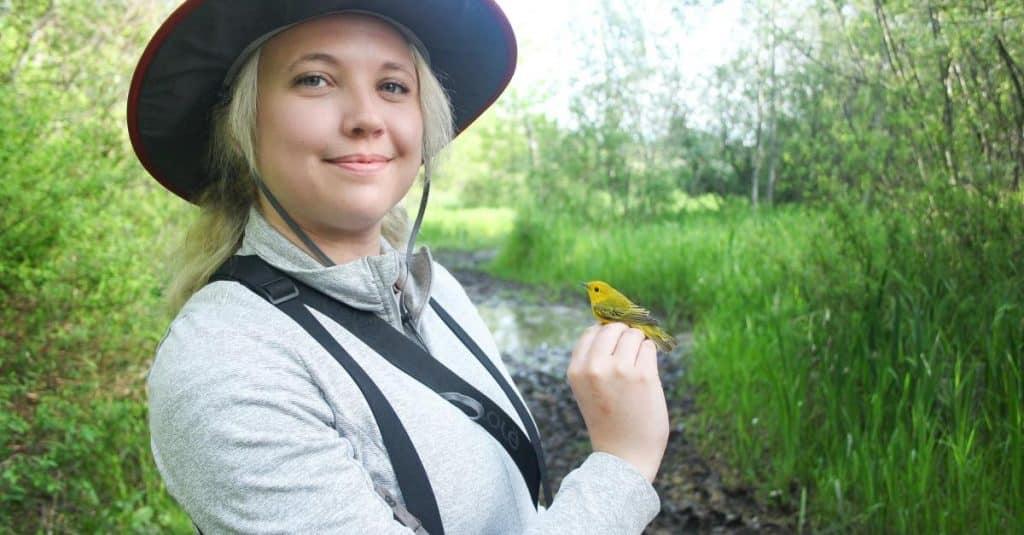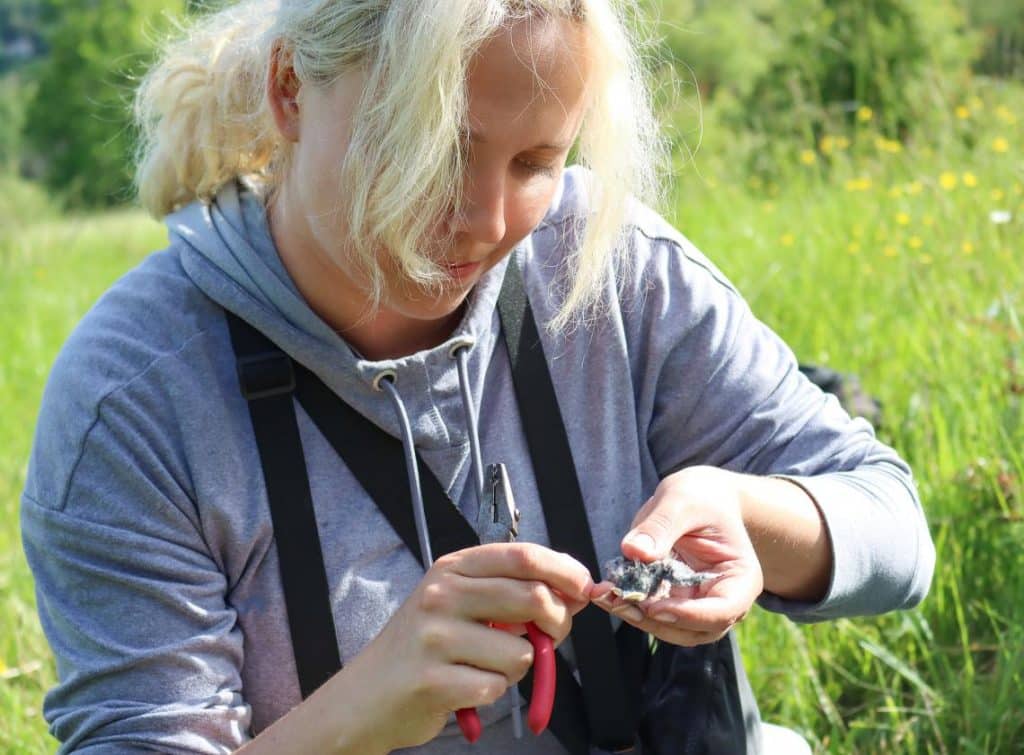
CUR congratulates Amelia Ahern-Rindell (University of Portland) and Winny Dong (California State Polytechnic University – Pomona) as they are appointed a 2025 CUR Fellow. The CUR Fellows Award for Excellence in Undergraduate Research Leadership annually recognizes a CUR member who is a leader and role model within the undergraduate research community and whose career represents the values and ideals represented in CUR’s Characteristics of Excellence in Undergraduate Research. Drs. Ahern-Rindell and Dong are to be honored for their leadership and service as role models for those involved in undergraduate research, scholarship, and creative activities. Both will be celebrated during a virtual Award Ceremony on Tuesday, June 10, 2025. You can RSVP to the ceremony here.
Dr. Amelia Ahern-Rindell, University of Portland
“Dr. Ahern-Rindell’s unwavering dedication to undergraduate research and mentorship has profoundly shaped both her students and the broader academic community,” said Lindsay Currie, CUR’s executive officer. “Her selection as a CUR Fellow is a well-earned recognition of her tireless efforts to expand research opportunities, foster a culture of inquiry, and champion innovation in undergraduate education. Even in emeritus status, her commitment remains evident through her contributions to advancing best practices, including her work on Probing Faculty, Student, Disciplinary, and Institutional Influences: CUR Transformations Project. Her legacy of mentorship and advocacy will continue to inspire and empower future generations of researchers.
Ahern-Rindell is a recipient of several research and mentor awards including the University of Portland’s Mentor of the Year Award (2022) and Provost’s Council Award for Exhibiting Excellence in Advising and Mentoring (2018), the Sigma Xi National Honors Society Columbia-Willamette Chapter’s Outstanding Faculty Established Researcher Award (2021), and CUR’s Biology Division Faculty Mentor Advanced Career Award (2019). Amongst the many honors, Ahern-Rindell has been featured in cover stories, published opinion pieces, peer-reviewed articles, and co-authored publications with research students. She remains an advocate for undergraduate research through her continued involvement with many member organizations, but also on campus supporting the infrastructure and programs of research, acquiring funds that have been instrumental to the success of many programs, such as the University of Portland’s Summer Undergraduate Research Experience (SURE). Ahern-Rindell’s dedication to inclusive mentorship and high-impact research experiences has left a lasting impact on both students and faculty colleagues. As she transitions into emerita status, her legacy continues through the programs she helped establish, the students she inspired, and the broader academic community she enriched.
“The University of Portland community is very proud that Associate Professor Emerita Dr. Ami Ahern-Rindell has been recognized as a CUR Fellow,” states Dr. Megel, University of Portland’s provost. “During more than 25 years at UP, Dr. Ahern-Rindell effectively supported undergraduate students to conduct research. She personally mentored more than 100 research students in her genetics lab, many of whom went on to medical and other graduate school programs. Dr. Ahern-Rindell also advocated successfully for the expansion of research opportunities for undergraduates in all disciplines at UP. She was instrumental in establishing college and university-wide programs that continue to provide high-impact experiences for many undergraduate students within and beyond the natural sciences. The University of Portland thanks Dr. Ahern-Rindell for her dedication to our students and congratulates her on this prestigious award.”
Ahern-Rindell states, “I am thrilled to be one of the 2025 recipients of the CUR Fellows Award. Over the years, I have learned much from my CUR colleagues and have been in awe of their dedication to Undergraduate Research, Scholarship and Creative Inquiry. I have shared this knowledge with my University of Portland colleagues, and I am pleased with what we have accomplished to make a thriving and impactful campus-wide undergraduate research program. Most of all, I am grateful for the many years I have spent with my student collaborators in the lab conducting research together.”
Dr. Winny Dong, California State Polytechnic University – Pomona
“Dr. Winny Dong’s dedication to undergraduate research and mentorship has been truly transformative, providing students with invaluable opportunities to engage in hands-on learning and scholarly exploration,” said Lindsay Currie, executive officer at CUR. “Her leadership in fostering curiosity, innovation, and academic excellence has empowered countless students to reach their full potential. In addition to her mentorship, Dr. Dong’s contributions as editor of Characteristics of Excellence in Undergraduate Research have helped shape best practices in undergraduate research, further strengthening the foundation for future scholars. Being named a CUR Fellow is a well-earned recognition of her profound impact on undergraduate research and her tireless efforts to support and inspire the next generation.”
Over the past 24 years, Dong has mentored over 200 students directly, with a significant focus on supporting first-generation, low-income, and historically underserved students. Her mentorship has resulted in outstanding student success rates, with 98% earning a bachelor’s degree, 34% a master’s, and 13% a Ph.D.—far exceeding institutional averages. Beyond direct mentorship, Dong has created and sustained multiple undergraduate research programs, impacting over 5,000 students through scholarships, research experiences, and conference opportunities. As the founding director of the Office of Undergraduate Research at Cal Poly Pomona, Dong has led several initiatives to secure grant funding to support research programs. Recognized nationally, she was honored with the Presidential Award for Excellence in Science, Mathematics, and Engineering Mentoring by NSF and the White House in 2021. Through her work, she has demonstrated that undergraduate research is a powerful tool for student success and equity, ensuring that all students—regardless of background—can envision and achieve ambitious futures.
According to Cal Poly Pomona’s provost, Terri Gomez, “Winny Dong has an unparalleled record of championing undergraduate research at Cal Poly Pomona. Her leadership in founding multiple programs at our university and advocacy for undergraduate research has changed the lives of thousands of students, who, without her vision, may never have been exposed to the opportunities this high-impact practice provides. We are so proud of Dr. Dong and her achievement.”
“I am deeply grateful to the Council on Undergraduate Research for the role it has played in my professional growth, in connecting me with like-minded mentors, and in the leadership opportunities it has provided,” explains Dong. “Receiving the CUR Fellows Award is a true honor. I have witnessed how undergraduate research experiences can transform students – providing them the confidence, skills, and support they need to succeed in school and beyond. Being part of the students’ journeys is what motivates me to continue to grow my mentoring practice, create undergraduate research opportunities, and support others who are passionate about mentoring. This award also highlights the supportive environment at Cal Poly Pomona and the amazing students it serves.”
Founded in 1978, the Council on Undergraduate Research (CUR) is an organization of individual, institutional, and affiliate members from around the world that share a focus on providing high-quality and collaborative undergraduate research, scholarly, and creative activity opportunities for faculty and students. Nearly 700 institutions and more than 13,000 individuals belong to CUR. CUR believes that faculty members enhance their teaching and contribution to society by remaining active in research and by involving undergraduates in research, and that students engaged in undergraduate research succeed in their studies and professional advancement.
Cal Poly Pomona is the No. 1 polytechnic university for diversity and economic mobility, recognized for helping students from all backgrounds improve their financial futures and achieve their dreams of career success. CPP is nationally ranked as one of the top public universities in the West (U.S. News & World Report), among the best colleges in America (The Wall Street Journal) and a “best bang for the buck” (Washington Monthly). With eight academic colleges, CPP offers hands-on learning inside and outside the classroom in more than 100 undergraduate and graduate degree programs. Founded in 1938, it is the largest of three polytechnic universities in the California State University — the largest four-year public university system in the United States. Of the more than 27,000+ students served by CPP, most are the first in their families to attend college, and more than two-thirds receive financial aid. With a unique agricultural heritage and desirable geographic location in sunny Southern California near vibrant Los Angeles, it is the only university where students can ride an Arabian horse, design and construct an award-winning Rose Parade float and launch a rocket into space.
The University of Portland is an independently governed Catholic university guided by the Congregation of Holy Cross; with a mission focusing on teaching and learning, faith and formation, and service and leadership. It is the only school in Oregon to offer a College of Arts & Sciences, a graduate school, and nationally accredited programs in the schools of business, education, engineering, and nursing. The University of Portland provides paid and for-credit undergraduate research opportunities across the university through collaborative projects with faculty. With clearly defined learning objectives and outcomes, these experiential learning opportunities develop crucial skills and allow students to explore career paths. University of Portland is consistently a top-ranked school among colleges and universities in the American West.



